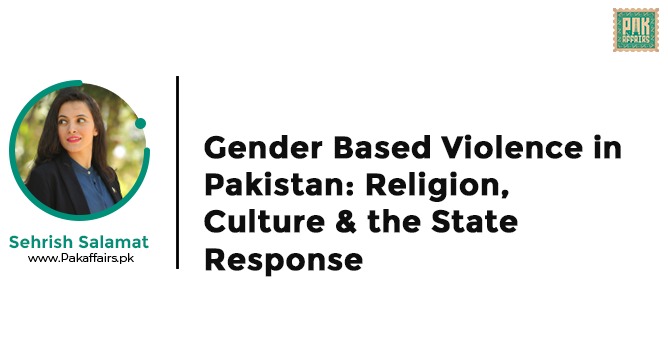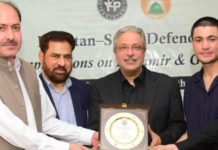Gender-Based Violence (GBV) is a complex and multidimensional phenomenon that is intertwined with cultural, religious, and political aspects of society and needs to be deconstructed from an interdisciplinary perspective. GBV is on the rise all over the world. Women’s rights organizations, government departments and civil society actors have raised alarm over the reports of GBV and increased demand for emergency shelters. According to the Gender Crime Cell at the National Police Bureau, over 25,000 cases of GBV were reported to police in Pakistan in 2020.
Gender-Based Violence
GBV is violence that is directed against an individual or group of individuals on the basis of their gender. This includes violence against women and girls as well as men and boys, lesbian, gay, bisexual, transgender, and intersex (LGBTI) people, and other individuals who may not conform to strict gender roles. According to the definition of GBV stated by the UN’s Inter-Agency Standing Committee, “…an umbrella term for any harmful act that is perpetrated against a person’s will and that is based on socially ascribed (i.e. gender) differences between males and females. The term is primarily used to underscore the fact that structural, gender-based power differentials between males and females around the world place females at risk for multiple forms of violence. This includes acts that inflict physical, mental or sexual harm or suffering, threats of such acts, coercion and other deprivations of liberty, whether occurring in public or in private life”.
Religious and Culture perspectives on GBV
In order to understand GBV, it is important to deconstruct the term ‘gender’. According to the World Health Organization, gender refers to the “characteristics of women, men, girls and boys that are socially constructed. These include norms, behaviors, and roles associated with being a woman, man, girl, or boy, as well as relationships with each other. As a social construct, gender varies from society to society and can change over time”. The social expectations that create stereotypical norms for a ‘gender’ have often legitimized the confinement of women to indoors, closed doors on them to knowledge and work opportunities, and deprived them of inheritance and many other rights. Since the industrial revolution though, women’s rights movements all over the world have challenged the antiquated, discriminatory, and repugnant gendered social norms and strived for an egalitarian society where the sex of a person plays little role in determining or constraining what they can and cannot do.
The discursive roots of domestic violence in prevalent Islamic thought lie in the concepts of ‘qiwamah’ (the authority husband is said to enjoy over his wife) and ‘wilayah’ (the right of male family members to be the guardian over women. These together create a perception that men are ‘in charge of women and despite not being mentioned in the Quran, are inscribed in Muslim family laws in many countries. These are further enforced by the concept of ‘nafaqa’ (maintenance) where women’s obedience to husbands in return for financial support is placed at the heart of the marital contract and reinforces the unequal relationship between the spouses. The Quran’s verse 4:34 is interpreted in this context to support a man’s right to discipline his wife for disobedience even through the use of force.
According to the hudood laws, it required a stringent level of evidence to establish the crime. To furnish evidence with a such threshold (availability of four witnesses) in Zina cases, therefore, has remained insurmountable making it extremely difficult for women to prosecute their rapist. The concept of patriarchy was developed and used by various sets of feminist theorists to explain the perpetual male dominance in modern societies. Various shades of contemporary feminist theories such as the liberal, radical, Marxist, and socialist variations agree that patriarchy denotes a social power system dominated by men, however, they differ in their explanation for underlying sources that sustain such a system and also in terms of their proposed solutions for an egalitarian society.
State response to the GBV in Pakistan
Basic human rights are enshrined in the Constitution of Pakistan. Article 25 clause 2 clearly states that no one must be discriminated against on the basis of their sex alone. The government of Pakistan recognizes GBV as a form of sexual discrimination and thus against the basic tenets of the constitution. The country has enacted some laws to curb GBV. These include the Protection Against Harassment of Women at Workplace Act, 2010; The Prevention of Anti-Women Practices – Criminal Law Third Amendment Act, 2011 and the Domestic Violence Protection and Prevention Act, 2012. It is also a signatory to a number of international treaties in this regard, including The Beijing Declaration and Platforms for Action, the Convention on the Rights of Child, the Convention on Elimination of all Forms of Discrimination against Women, The International Covenant of Social, Economic and Cultural rights, The Sustainable Development Goals and The Universal Declaration of Human Rights. Despite these laws and commitments, the implementation of these is ineffective and sketchy. There is also fierce resistance within government institutions to some of these.
Conclusion
The historical, systematic inequality along gender lines of power and economic resources. This creates financial and social dependence of women and transgender on men. Without independent sources of income and assets, women are forced to endure various forms of violence and have fewer alternatives to meet their basic needs. Second, it is evident from the data how cultural and religious discourses combine to legitimize violence against women. The regressive cultural norms are often justified as the ‘natural order of society and the ‘will of God’. It is only through groundbreaking intellectual work and the efforts of a new generation of women’s rights activists that new practices may take root in transitional societies like Pakistan. A ‘new consciousness’ of rights and responsibilities developed as a result, and translated into a reduced economic and power gap is the only way to create a just and peaceful society in Pakistan and beyond.




